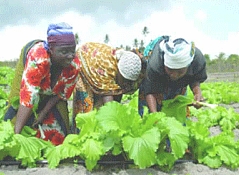Investment in Women Key to Food Security
Published on 10th August 2009
Expressing concern over the lack of women in decision-making roles in agricultural development issues in Africa, a group of leading African women scientists urged African leaders and US policymakers to put women at the center of efforts to address chronic hunger and poverty in sub-Saharan Africa.
During a visit by US Secretary of State Hillary Clinton and Secretary of Agriculture Tom Vilsack to research facilities outside Nairobi, the group, comprising both veteran and up-and-coming Kenyan women scientists, argued that, only if women can exert more influence over priorities, policies and programs, will sub-Saharan Africa be able to ward off future food crises and cope effectively with more frequent drought and other impacts of climate change.
"The outstanding achievements of the women of the AWARD program serve as a model and inspiration to women farmers all over Africa," says. "As part of President Obama's international initiative to help millions become food secure, a focus on women farmers will be an important and integral part of this effort."
 |
| Women farmers Photo courtesy |
Women account for as much as 80 percent of
Africa’s food production. But their access to land, to vital services, such as credit, and to improved technologies is extremely limited. They receive only 5 percent of agricultural extension training and 10 percent of rural credit. Furthermore, few agricultural projects are being designed to address women’s specific needs. Only a quarter of its researchers and development experts are women, and only 14 percent of the management positions in agricultural research and development are female.
“Science is crucial to building a pathway out of poverty,” says Sheila Ommeh, a Kenyan scientist at the International Livestock Research Institute (ILRI). “Yet, few young Africans are pursuing careers in agricultural research and science. We need support in expanding that number.”
Measures like the US Global Food Security Act of 2009 are a step in the right direction, the group said. But the impact of this initiative will be limited unless it is reinforced by more targeted efforts to provide Africa’s women farmers with the technical and financial resources they must have to respond to new economic opportunities.
“Investing in women is the smart solution to Africa’s hunger,” Kenyan horticulture professor Mary Abukutsa-Onyango says. “It will help ensure that US development resources yield maximum returns in reducing food insecurity and poverty.”
The scientists form part of a program called African Women in Agricultural Research and Development (AWARD). Coordinated by the Gender and Diversity Program of the Consultative Group on International Agricultural Research (CGIAR), AWARD provides 60 fellowships yearly to boost the female talent pool supporting Africa’s farmers, ith support from the Bill & Melinda Gates Foundation and United States Agency for International Development (USAID).
According to Vicki Wilde, director of the Gender and Diversity Program of the CGIAR, “Agriculture is recognized as an engine for economic growth in Africa. What is less well recognized is that women run this engine. From before dawn to after dusk, they keep all its parts moving.We cannot defeat hunger and poverty in Africa unless women have a strong voice.”
Despite the limitations faced by Africa’s female farmers, recent cases demonstrate how well-crafted policies and programs can achieve major impact by targeting women, based on knowledge of their important role in agricultural production, according to the World Development Report 2008: Agriculture for Development.
A CGIAR program aimed at widening the impact of improved bean varieties reached more than 35 million rural people in seven countries of eastern and southern Africa by targeting women, who primarily grow the crop. Bean experts relied on informal channels to which female farmers have ready access, like community and church groups, for distributing small, affordable packets of bean seed. Offering 30 to 50 percent higher yields, the highly nutritious and marketable new beans are helping women bolster household food security and raise their incomes.
Ommeh and Abukutsa-Onyango point to further opportunities for smart investment in women farmers, focused on the production of local chicken breeds that are resistant to disease and marketing of indigenous African vegetables. The scientists also stress that, in order for such initiatives to multiply and succeed, it is vital that African women gain more influence over priorities, policies and programs.
An encouraging sign are recent findings showing the gender gap in Africa’s agricultural science narrowing. Between 2000 and 2008, the proportion of female professional staff in Africa’s agricultural research and higher education grew from 18 to 24 percent, according to a recent study carried out by AWARD and the CGIAR-supported International Food Policy Research Institute (IFPRI).
“Even women scientists who have completed their education and entered the workforce may still drop out because of obstacles they encounter on the career ladder, so few reach positions of leadership,” says Wilde. “AWARD better enables these women to stay on track by supporting them in their efforts to help farmers in their countries.” Now in its second year, AWARD has provided fellowships to 121 women scientists from 10 countries in sub-Saharan Africa.
The World Development Report 2008 concluded that “women need to be engaged at far more senior levels than is generally the case – in scientific research, in ministries of agriculture and in local governments.”
“To bring about Africa’s long-awaited revolution in smallholder production,” Wild explains, “agricultural research and extension organizations must recognize the importance of women farmers and of their social networks for diffusing technology and knowledge. They urgently need to recruit and train more female staff, especially in places where cultural norms restrict interaction between males and females.”
Courtesy CGIAR/AWARD.
This article has been read 2,813 times

